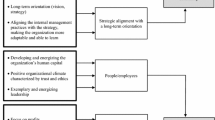Abstract
This article describes the European Corporate Sustainability Framework (ECSF). This framework addresses complex issues such as Corporate Sustainability, Corporate Responsibility and Corporate Change. It is a conceptual framework based on the tradition of the quality management approach and the concept of phase-wise development. The framework is based on several theories and models, all proven individually over several decades. These theories are the Emergent Cyclical Levels of Existence Theory (ECLET) of Professor Graves, The Four Phase Model© (Hardjono), EFQM's Business Excellence Model, Kaplan and Norton's Business Balanced scorecard, the research deliverables of the project “The European Way to Excellence” and the SqEME® methodology. All these models, theories and/or studies belong to the interpretative sociology (Milwax Burell and Morgan, 1992). The aim of the ECSF is to support organizations in their implementation of Corporate Sustainability and Corporate Responsibility (CS-R) by addressing the ambiguity and complexity of these issues.
Similar content being viewed by others
References
Ansoff, H. I. and E. J. Mc Donnel: 1990, Implanting strategic management, 2nd Edition. Prentice Hall, New York.
Athos, A. and R. en Pascal: 1986, The art of Japanese management (Penguin, Harmondsworth).
Elkington, J.: 1997, Cannibals with Forks. The Triple Bottom Line of 21st Century Business, (Capstone Publishing Ltd, Oxford, UK).
Brown, Mark Graham.: Baldrige Award Winning Quality (Productivity Press, New York).
EFQM, /www.efqm.org/
Graves C.: 1970, 'Levels of Existence: An Open System Theory of Values', The Journal of Humanistic Psychology, Fall 10(2), 131–154.
Graves C.: 1974, Human Nature Prepares for a Momentous Leap, The Futurist magazine, April pp. 72–87.
Hardjono, T. W. and S. ten Have: 1996, The European Way to Excellence (Quality Publication Ltd).
Hardjono, T. W. and F. W. Hes: 1993, De Nederlandse Kwaliteitsprijs en Onderscheiding (Kluwer, Bedrijfswe-tenschappen).
Hardjono T. W.: 1995, Ritmiek en Organisatiedynamiek (Kluwer, Vierfasenmodel).
Hardjono T. W. and R. J. M. Bakker.: 2001, Management van processen (Kluwer/ INK).
Kaplan, R. S. and D. P. Norton: 1996, The Balanced Scorecard: Translating Strategy into Action (Harvard Business School Press).
Koopman, P. L. and en J. Pool: 1992, Management en Besluitvorming in Organisatioes: Een Srategisch Perspectief (Van Gorcum, Assen).
Kotler, P.: 1994, Marketing Management: Analysis, Planning, Implementation and Control. 8th Edition. (Prentice Hall, Englewood Cliffs).
Linnanen, L. and V. Panapanaan: 2002, 'Roadmapping CSR in Finnish Companies', (Helsinki University of Technology).
Marrewijk, M. van.: 2003a, 'Concepts and Definitions of Corporate Sustainability', Journal of Business Ethics.
Marrewijk, M. van.: 2003b, 'European Corporate Sustainability Framework', International Journal of Business Performance Measurement.
Marrewijk, M. van and M. Were: 2003, 'Multiple Levels of Corporate Sustainability', Journal of Business Ethics.
Marrewijk, M. van and T. W. Hardjono: 2003, 'ECSF for Managing Complexity and Corporate Change', Journal of Business Ethics.
Marrewijk, M. van and T. W. Hardjono: 2001, The Social Dimensions of Business Excellence, Corporate Environmental Strategy 8,(3).
Meadows, D.: 1972, The Limits To Growth, A Report foor the Club of Rome Project on The Predicament of Mankind, (Universe Books, New York).
Milwak Burell, G. and G. Morgan: 1992, Sociological Paradigm and Organizational Analysis: Elements of the Sociology of Corporate Life (Aldershot, Ashgate).
Mintzberg, H.: 1979, The Structuring of Organizations: A Synthesis of the Research (Prentice Hall, Englewood Cliffs).
Morgam, G. Images of organizations. London Safe, 1986.
Quinn, R. E. and J. Rohrbaugh: 1983, 'A Spatial Model of Effectictiveness Criteria: Towards a Competing Values Approach to Organizational Analysis. Providence', (The Institute of Management Sciences).
Quinn, R. and K. Cameron: 1999, Diagnosing and Changing Organisational Culture, (Addison Wesley Longman, inc.).
Stacey, D. Ralph.: 2001, Complex Responsive Processes in Organizations (Routledge, USA).
Toffler A.: 1980, Third Wave (William Morrow & Company, New York).
Toffler A.: 1970, Future Shock (Random House, New York).
Van Velzen R. C. G., J. N. A. Van Oosten., T. Snijders and T. W. Hardjono: 2002, Process management en de SqEME _-benadering (Kluwer, Deventer).
Wilber, K.: 1995, Sex, Ecology, Spirituality: The Spirit of Evolution (Shambhala, USA).
Wilber, K.: 2000, A Theory of Everything: An integral vision for Business, Politics, Science and Sprirituality (Shambhala, USA).
Zuijderhoudt, R. W. L.: Stand van de Synergetica en genetica (Utrecht, Berenschot).
Author information
Authors and Affiliations
Rights and permissions
About this article
Cite this article
Hardjono, T., de Klein, P. Introduction on the European Corporate Sustainability Framework (ECSF). Journal of Business Ethics 55, 99–113 (2004). https://doi.org/10.1007/s10551-004-1894-x
Issue Date:
DOI: https://doi.org/10.1007/s10551-004-1894-x




